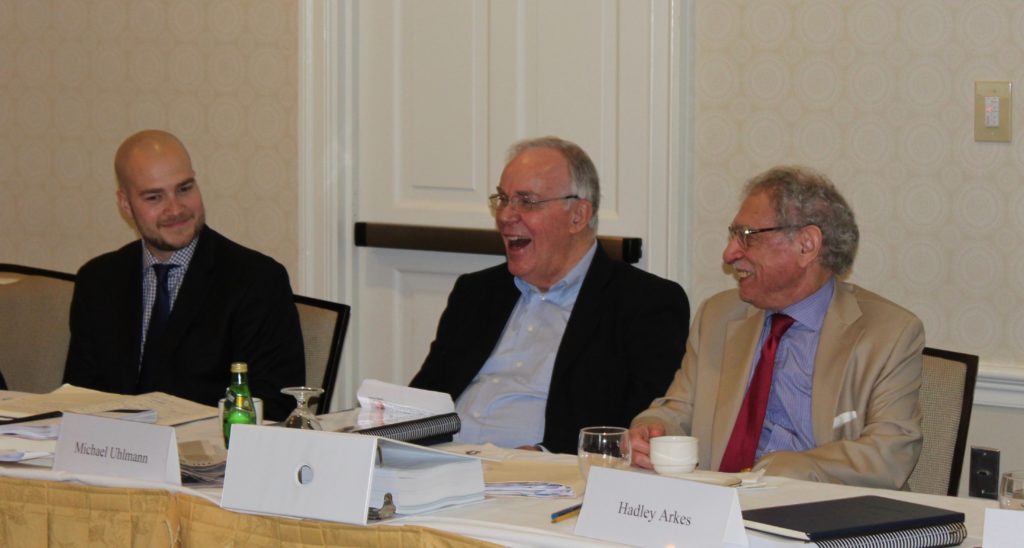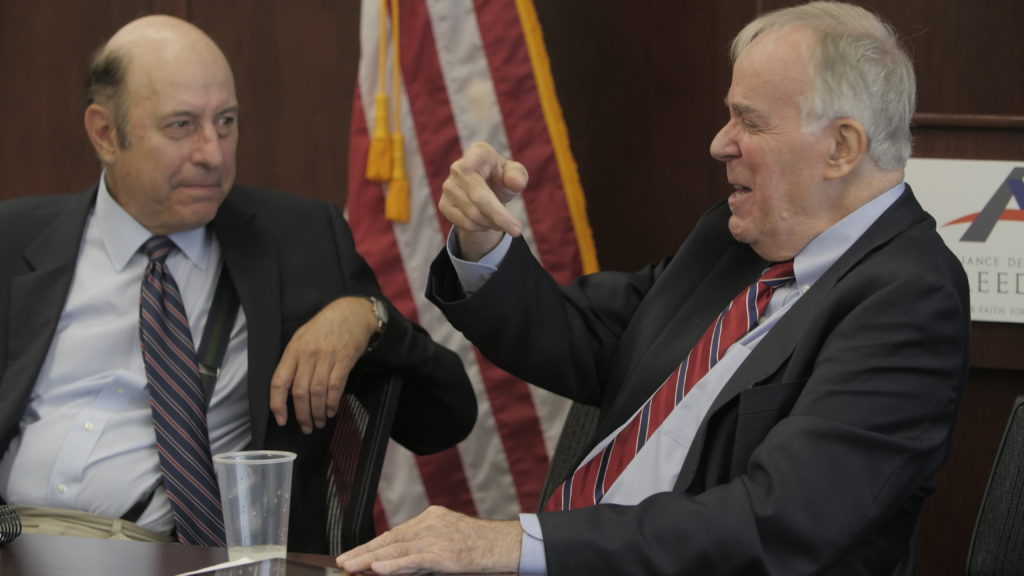×
Search
Michael Martin Uhlmann: In Memoriam (1939-2019)
By The James Wilson Institute •
Posted on Oct 9 2019

JWI Founder and Director Hadley Arkes writes on the passing of one of his dearest friends, JWI Senior Scholar Michael Uhlmann.
We come to our friends today with heart-breaking news, on the death of our beloved Michael Uhlmann yesterday in California. In my own case, I've lost one of my dearest, closest friends, and the country has lost one of its most gifted, wisest teachers and public servants. I told a good part of Mike's story when I dedicated my book Natural Rights & the Right to Choose (2002) to Michael Martin Uhlmann. That dedication ran far longer than dedications usually ran, because Mike was always too modest to tell his own story. I made a point of that in the dedication, just as I insisted that the story had to be told.
We are posting that dedication below. And we will be running, in the days to come, recordings of Mike in various lectures and commentaries he has done. We may also be open to letters of recollection, or memories of Mike, that people might be moved to offer. Especially prized for us is the talk Mike had done every year, as part of our seminar with young lawyers, on the remarkable person and statecraft of John Marshall. That talk has become a classic, and we include a recording below. It was magnificent in part because of the love and breadth of learning that Mike brought to the subject, but in part also because of the way Mike managed to show how Marshall's shaping of our jurisprudence must establish his standing as a truly preeminent figure in the work of the American Founding.
But right now we pray for Mike--and hold to his memory.
--Hadley Arkes, October, 9, 2019

Prof. Arkes's dedication of Natural Rights and the Right to Choose to Michael Uhlmann.
"The
final word is for Michael Uhlmann. Man of letters, counsel without peer,
raconteur with limitless range, sustainer of families, runner to the rescue,
devoted son of the Church, maddeningly self-effacing. For matters of moral
consequence, enduring alertness; for pretension, unremitting jest. And in
friendship, untiring, with the touch of grace that lifts everything. I write
here with a free hand, not holding back, because I fill in a story that the
principal himself will ever be too modest to set down. He immersed himself in
Elizabethan literature at Yale, then went back for a while to teach at his
beloved Hill School. But then to the law, at the University of Virginia, with
the same depth of engagement, this time in jurisprudence and philosophy.
Following philosophy out of the clouds, he moved thence to political
philosophy, to earn his doctorate, studying with Leo Strauss and Harry Jaffa in
Claremont. His natural - or supernatural - gifts of teaching kept him for a
while in the academy, until the academy turned upside down in the turmoil of
the late 1960s. He had done a master work on the Electoral College, and he was
drawn away to Washington, to Senator Hruska, to save the Electoral College,
when it was subject again, in the 1970s, to another bootless campaign to end
it. The recurring melodrama would play out once again: the affectation of shock
that we should be governed in modern times by such an anachronistic device,
followed by an awareness, slowly setting in, that every practical alternative
was notably worse or unworkable. The passion for reform would usually exhaust
itself before Michael could go on to show that this arrangement, devised by the
likes of Gouverneur Morris, might actually have something to do with preserving
constitutional government in a continental republic. Staying in Washington,
Michael would join the staff of Senator James Buckley, where he wrote the first
Human Life Amendment. He would be recruited to the Department of Justice under
President Ford, where he would shepherd John Paul Stevens to confirmation at
the Supreme Court, and eventually persuade a young Clarence Thomas that he
could find his vocation in judging. With the advent of the Reagan
administration, Michael became counselor to the president, where he argued
compellingly, and dealt deftly, on matters freighted with a moral significance.
He took an active lead in propelling the administration into action, in dealing
with the Baby Doe cases that arose in the 1980s. In those cases, parents sought
to withhold medical care from newborn infants afflicted with Down's syndrome
and spina bifida. If there was a federal presence, casting up alarms, standing
against the trends, it was there mainly as a function of his own art.
"At one moment, he was persuaded by his friends to let himself be
appointed to the federal court of appeals in the District of Columbia. But that
was also the moment when the rigors of teenage years began to be felt keenly in
a family of five children, and he came to the judgment that his energies and
wit had to be absorbed more fully in the family at that moment than in the
courthouse. For his friends it has been a lasting source of disappointment that
he did not take that appointment - as it has been a source of pride among the
same friends that he made the decision he did. But in public office, or in
private practice, returning to teaching, or to the life of a private
foundation, his counsel has been sought by people at every level in the
country, from Attorneys General and presidents to kids in the shipping room. He
continues to be, at every turn, the sustainer of everyone else. I have pleaded
with him never more to write an essay or speech with the willingness to put, in
place of his own name, the name of a figure in public office. In the judgment
of his friends, he has been too inclined to efface himself, with rationales too
public-spirited: namely, that the byline of a public figure will draw more
attention to the argument, and the argument may be far more important than the
name attached to it. With the same temper, he is apt to spend Thanksgiving Day
working at a kitchen in the parish or painting walls for nuns. And on Christmas
morning, his friends are likely to find gifts laid at the doorstep, from a
messenger evidently sweeping past in a Mercury station wagon rather than a sleigh.
When he returned to teaching, with a stint back in Claremont, one of his
students wrote in a review that "Professor Uhlmann could read the
telephone book and make it compelling." He could also, no doubt, lead the
students into its deeper implications and find, somewhere in that prosaic
thing, the lurking premises of modernity.
"In the course of this book I describe the proposal I had shaped as the
most modest first step of all on abortion: to preserve the life of the child
who survived the abortion. When it appeared to be the moment to revive
that proposal in 1998, Michael made the rounds with me on Capitol Hill, meeting
with senators, congressmen, and their staffs. He would take himself out of any
of his projects to join me, with a keen sense of what staffers on the Hill
would find helpful. With the right blend of respect and familiarity, and with
the authority of one who had been there before, he would make the case, and no
one made it better. Along with Robert George, of Princeton, he knew the logic
of that bill as well as the one who devised it. The sparest account of Michael,
and the one most readily recognized, might well be that account, in All's
Well That Ends Well, of Bertram's late father, a man legendary for his
wisdom in council. Of him the poet writes that
... his honour
Clock to itself, knew the true minute when
Exception bade him speak, and at this time
His tongue obeyed his hand.
"Governed by that hand, this account would have ended far earlier. But I
plead again for a certain license when the principal figure in the story will
never broadcast it himself. Lincoln, as a young politician, in his taut style,
defended his course and said, "If I falsify in this you can convict me.
The witnesses live, and can tell." In this account, I would invoke the
same claim, and the venture is even more warranted here Because the chief
witness would never tell or speak of what he has done. His friends know, and so
they must tell. Judy Arkes and Susannah Patton would no doubt skip the
embellishment, but they would confirm the judgment, and they would join me,
with deep affection, in dedicating this book to Michael Martin Uhlmann."
-H.A.
2002
×
